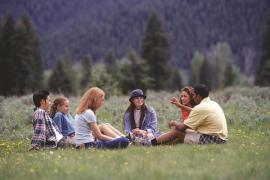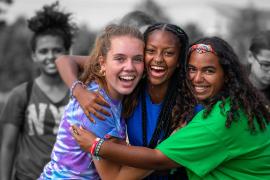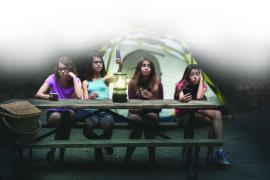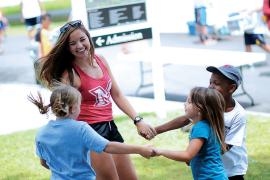Inflection points refer to everything from mathematical equations to management advice. But, equally, if not more, compelling is an application of the concept to the growth trajectory of youth.
Youth Development
"Way stations" along the path to healthy human development provide critical opportunities for reflection, recalibration, and growth. At Camp Rising Sun in Rhinebeck, New York, this is referred to as a "do-reflect-redo" approach. It states, "Campers try new things, plan projects, lead and follow their peers, and grow their community. By taking leadership roles, each camper learns what it means to be accountable to others and true to their own leadership styles. They learn decision-making, organizational, and problem-solving skills while strengthening their notions of teamwork and group identity.
"Counselors act as models and mentors, ensuring safety while encouraging exploration and innovation. Campers and counselors offer each other continuous feedback so that students may challenge themselves, fail sometimes, and learn from their mistakes — all in a safe space. Counselors ensure that the pace of the program allows this time for reflection, time that is often missing from our increasingly fast-paced lives" (LAJF, 2018).
Allowing Kids to Be Kids
Indeed, summer camps may currently reflect an almost ideal environment, largely free of electronic distractions. Young people can focus on discovering who they are, enjoying the carefree and seemingly innocuous pursuits of childhood, and developing the types of relationships that will nurture their innate abilities to establish meaningful connections with others — both peers and adults. In a pivotal piece published just prior to Christmas 2019, "Giving Your Children Experiences Instead of Toys Boosts Their Intelligence and Happiness," Kris Di suggests, "when children are showered with toys and games, they start playing less" (Di, 2019).
Key experiences are those centered on experiential learning, maybe especially at summer camps.
While technology and camp have different meanings to different people and, like much else in our fast-changing, head-spinning world, both pros and cons, a recent study by the University of Michigan's C.S. Mott Children's Hospital revealed that the "mixed bag" may be weighed more one way than the other. Ashley DeHudy, MD, a pediatrician at Mott with years of experience working at different camps, discussed this with Beata Mostafavi, health and science writer at University of Michigan Health System (Mostafavi, 2019).
On one hand, digital media provided positive opportunities, such as taking photos and making slideshows, helping camp staff stay connected to each other, keeping parents of children with special needs updated, and providing technology activities such as coding. Devices also helped with entertainment, allowing for dance parties, movies, and video game tournaments.
But many also described challenges digital media introduced to the camp environment.
There were common reports of campers so preoccupied with media interactions that they were unable to fully engage in camp activities. Communication between children and parents were more frequent than ideal, with some parents picking their child up early after an upset call home without camp staff being aware there was ever a problem. Devices could also lead to children being disruptive during instruction, as well as cyber bullying and late bedtimes.
As one respondent wrote, campers are "more worried about their phone than the poison ivy bush they're about to step in."
Some kids were also often discouraged from participating in talent shows or other activities in fear that their pictures could end up social media and be embarrassing. Digital media use among camp staff was also identified as problematic when it pulled them away from their roles.
"Negative themes predominately focused on distraction and kids not connecting to the camp community," DeHudy says. "On the flip side, another emerging theme was that some kids and teens welcomed the technology break."
Kids enjoying, well, just being kids.
Camp Cultures
One of the more transparent differences between school and camp environments is a radical departure from common culture, one described in a recent Education Week article. In it, Justin Minkel shares the following.
As teachers, we can make kids do almost anything we want. They're smaller than us. We have all kinds of power over them, from getting them in trouble at home to taking away the things that make school tolerable, like going outside for recess or sitting with their friends in class. But just because we can make our students do what we want doesn't mean we should.
Children aren't just smaller versions of adults. They are their own kind of being. They need to move, talk, question, and explore more than we do, because they're in the midst of that mind-boggling explosion of cognitive, physical, and social-emotional growth that marks childhood in our species. When it comes to behaviors like staying quiet or sitting still, it doesn't make sense to hold young children to norms better suited to adults, because the way they experience the world is fundamentally different from the way grownups do.
In school, we often ask children to do things that are unreasonable given their developmental level. Worse still, we sometimes ask them to do things we would never expect of adults.
As examples, Minkel cites the following common school rules:
- Silence
- Sitting still for a long time
- Forced apologies
- Zero tolerance for forgetfulness
Each sounds antithetical to camp. Minkel offers this conclusion:
We need to think hard about the demands we place on our students. Just because they obey the strictures we lay down doesn't mean those edicts are fair.
We can't expect the children in our care to behave like miniature adults. They need to move around more than we do. They need to make more noise than we do. They need to experience new concepts with their fingers, senses, and imaginative ability to consider not just the world as it is, but as it could be. Their curiosity, enthusiasm, and sense of wonder will never lend itself to straight lines and silent deskwork.
We spend so much time bending them to our way of doing things. We should pay more attention to theirs.
A Developmental Dance
All children and teens are working in their own way, at their own pace, on three prerogatives of personal growth: identity, independence, and "object relations," a fancy name for friendships. It is in the first of these constructs that we can discover the relevance of character to overall psychological and social health.
Psychologist Erik Erikson, in his "psychosocial stages of development," referred to this particular stage as "identity vs. role confusion." He accentuated the fact that identity is how an individual eventually defines oneself across a number of areas, including socially, emotionally, sexually and, eventually, vocationally. Erikson defined identity as "a subjective sense of invigorating sameness" similar to philosopher John Locke's concept of "psychological continuity" (Farr, 2014).
Similarly, Erickson believed that to experience wholeness, young people "must feel continuity" between how they think of themselves and how they perceive others think of them — again a reminder of the powerful role that mentors and role models play in choreographing the dance of development (Erikson, 1968).
The Antecedents of Character
David Brooks, a New York Times columnist, extrapolated from his own camp experience in his piece "How to Leave a Mark on People," the very title of which denotes the essential value of summer camp. He referenced the work of researchers from the University of Virginia, James Davidson Hunter and Ryan Olson, identifying "thick versus thin" frameworks of moral culture.
Brooks writes, "A thick institution becomes part of a person's identity and engages the whole person: head, hands, heart, and soul. So thick institutions have a physical location, often cramped, where members meet face to face on a regular basis, like a dinner table or a packed gym or assembly hall.
"Such institutions have a set of collective rituals — fasting or reciting or standing in formation. They have shared tasks, which often involve members closely watching one another, the way hockey teammates have to observe everybody else on the ice. In such institutions people occasionally sleep overnight in the same retreat center or facility, so that everybody can see each other's real self, before makeup and after dinner" (Brooks, 2017).
Sound familiar?
In a related vein, Angela Duckworth, the Christopher H. Browne Distinguished Professor of Psychology at the University of Pennsylvania and founder and scientific director of the Character Lab, whom Brooks quotes, said in a Twitter Post (12), "Thick cultures are the crucible of character. What makes a thick culture? Not one thing. Many." Among them are the following:
- Curiosity
- Grit
- Optimism
- Self-control
- Social intelligence
- Zest
Each is firmly embedded in replicable models of experiential learning.
Nice Kids — Character and Morality
Some have long advocated that an effective deterrence to bullying by "mean" kids might be replacing it with an incompatible alternative: teaching and advocating for friendship skills. As I reported in my Huffington Post column "Nice Kids," despite an arsenal of curricula designed to address bullying in all of its unsavory forms, we fail to take the time to teach children the attitudes and behaviors that represent the antithesis of bullying. Helping young people acquire "friendship skills" is not only an important part of socialization and character development, but also quite possibly a deterrent to bullying behavior.
That piece went on to cite the work of Characters of Character, a "nonprofit organization providing tools and resources to educators and parents to help teach children nine positive character traits: behavior, perseverance, friendship, healthy habits, manners, respect, responsibility, self-esteem, and kindness."
Any serious discussion of character engenders broader consideration of morality — perhaps a subjective if nonetheless critical component of character. Jean Piaget, a godfather of morality, so to speak, concluded, largely through observation of children at play, that belief systems about right and wrong are a part of a developmental process (Nucci, 2017). Additionally, important work by psychologist Lawrence Kohlberg posited that younger children (up to approximately age nine) simply follow the rules set by adults. The morality of most teens and adults, on the other hand, reflects an internalization of standards of valued adult role models, stressing the importance of relationships and maintaining social order (McLeod, 2013).
Camp and Character — The Difference Is You
Summer camps of all types play, or can play, an extraordinary role in the character development of their campers. To wit, the American Camp Association's article "Benefits of Camp" states, "Camp provides children with a community of caring adults who nurture experiential education that results in self-respect and appreciation for human value. All of the outcomes — self-identity, self-worth, self-esteem, leadership, and self-respect — build personal competencies . . . For years, campers' parents have reported that when their children return home from camp they are more caring, understand the importance of giving, are more equipped to stand up for what they know is right, and are willing to be more responsible. These are the qualities that will help build a successful nation and a civil society" (ACA, 2019).
Richard Lerner, PhD, director of the Institute for Applied Research in Youth Development at Tufts University, speaks to five constructs that summer camps routinely seek to promote among youth — competence, confidence, connection, character, and caring — which, in their totality, he says, may result in contribution.
And that is why character counts.
For More Information
To learn more, check out Stephen Gray Wallace’s new book, IMPACT — An Introduction to Counseling, Mentoring, and Youth Development, which, among other ideas, talks about “the main thing:” helping young people feel “lovable and capable,” both important components in the development of character. For more information, visit IMPACTtheBook.net. The book is also available for purchase in the ACA Bookstore.
References
- American Camp Association. (2019). Benefits of camp. Because of Camp. ACA. Retrieved from ACAcamps.org/campers-families/because-camp/benefits-camp
- Brooks, D. (2017, April 18). How to leave a mark on people. The New York Times. Retrieved from nytimes.com/2017/04/18/opinion/how-to-leave-a-mark-on-people.html?rref=collection%2Fcolumn%2Fdavid-brooks&action=click&contentCollection=opinion®ion=stream&module=stream_unit&version=latest&contentPlacement=
- 3&pgtype=collection
- Business Dictionary. (2020). Strategic inflection point. Web Finance, Inc. Retrieved from businessdictionary.com/definition/strategic-inflection-point.html
- Character Lab. (2017). About character lab. Retrieved from characterlab.org/about/
- Characters of Character NFP, Inc. (2020). Characters of character. Retrieved from charactersofcharacter.org/
- @angeladuckw. (2017, April 18). Thick cultures are the crucible of character. What makes a thick culture? Not one thing. Many. nytimes.com/2017/04/18/opinion/how-to-leave-a-mark-on-people.html?_r=0 …" Twitter, 18 April 2017, 5:49 p.m., twitter.com/angeladuckw/status/854497216433704965?lang=en.
- Di, K. (2019, December 16). Giving your children experiences instead of toys boosts their intelligence and happiness. I Heart Intelligence. Retrieved from iheartintelligence.com/giving-children-experiences-instead-of-toys-boosts-intelligence-happiness/
- Erikson, E. (1968). Identity: Youth and crisis. New York, NY: W.W. Norton and Company, Inc.
- Erikson Institute. (2014). About Erik Erikson. Retrieved from erikson.edu/about/history/erik-erikson/ (8 Jan. 2020).
- Farr, T. (2014, May 8). Child development theories for parents and educators: an overview. Udemy. Retrieved from blog.udemy.com/child-development-theories/
- Korfmacher, C. (2016). Personal identity. Internet Encyclopedia of Philosophy. Retrieved from iep.utm.edu/person-i/
- Lesson Planet. (2020). Inflection points. Teacher Planet. Retrieved from lessonplanet.com/teachers/inflection-points-11th-higher-ed
- Lerner, M., Lerner, J. et. al. (2016). The positive development of youth: Comprehensive findings from the 4-H study of positive youth development. Institute for Applied Research in Youth Development. Tufts University. Retrieved from 4-h.org/wp-content/uploads/2016/02/4-H-Study-of-Positive-Youth-Development-Full-Report.pdf
- Louis August Jonas Foundation. (2018). Curriculum. Retrieved from lajf.org
- McLeod, S. (2013, October 24). Kohlberg's stages of moral development. Simply Psychology. Retrieved from simplypsychology.org/kohlberg.html
- Minkel, J. (2019, April 8). 4 things teachers shouldn't be asking their students to do. Education Week. Retrieved from edweek.org/tm/articles/2019/04/08/4-things-teachers-shouldnt-be-asking-their.html
- Mostafavi, B. (2018, May 8). Cellphones at summer camp: Research explores the effects. Michigan Medicine. University of Michigan. Retrieved from labblog.uofmhealth.org/rounds/cellphones-at-summer-camp-research-explores-effects
- Nucci, L. (2017). Jean Piaget: The shift from heteronomy to autonomy. Domain Based Moral Education Lab, University of California, Berkeley, Graduate School of Education. Retrieved from moraledk12.org/jean-piaget
- Wallace, S. (2016, March 9). Who I am. Psychology Today. Retrieved from psychologytoday.com/us/blog/decisions-teens-make/201603/who-i-am (8 Jan. 2020).
- Wallace, S. (2017a, June 13). Thick and thin. Psychology Today. Retrieved from psychologytoday.com/us/blog/decisions-teens-make/201706/thick-and-thin
- Wallace, S. (2017b, October 11). Nice kids. HuffPost. Retrieved from huffpost.com/entry/nice-kids_b_59decd56e4b0cee7b9549de1
- Wallace, S. (2019, July 9). The main thing. Psychology Today. Retrieved from psychologytoday.com/us/blog/decisions-teens-make/201907/the-main-thing
Stephen Gray Wallace, MS Ed, is president/director of the Center for Adolescent Research and Education (CARE), a national collaborative of institutions and organizations committed to increasing favorable youth outcomes and reducing risk. He is a consultant to camps on staff training and teen leadership programming and has broad experience as a camp director, school psychologist and adolescent/family counselor. Stephen is a member of the professional development faculty at the American Academy of Family Physicians and American Camp Association and a parenting expert at kidsinthehouse.com, NBC News Learn, and WebMD. He is also an expert partner at RANE (Risk Assistance Network & Exchange) and was national chairman and chief executive officer at SADD for more than 15 years. Additional information about Stephen's work can be found at StephenGrayWallace.com.
© Summit Communications Management Corporation 2020. All Rights Reserved.
Photo courtesy of YMCA Camp St. Croix, Hudson, Wisconsin.




